|
|
|
Sort Order |
|
|
|
Items / Page
|
|
|
|
|
|
|
| Srl | Item |
| 1 |
ID:
191462


|
|
|
|
|
| Summary/Abstract |
Through a comprehensive review of documents recovered from Usama bin Ladin’s Abbottabad compound, this study provides a new periodization of al-Qaeda’s relationship with Iran. The analysis reveals that al-Qaeda often had to reconcile conflicting operational and ideational pressures in its interactions with the Islamic Republic over time. Beyond offering insight into the trajectory of this important relationship and direction for future scholarship, the analysis suggests some ways through which the United States might expand the strategic wedge that exists between these unlikely allies and highlights the need for a more flexible understanding of state sponsored terrorism.
|
|
|
|
|
|
|
|
|
|
|
|
|
|
|
|
| 2 |
ID:
191468
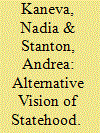

|
|
|
|
|
| Summary/Abstract |
This study contributes to efforts to theorize contemporary challenges to the nation-state as a normative governance unit through an analysis of Islamic State’s state ideology. It is argued that, by reinterpreting concepts from Islamic history, IS puts forth a religiously motivated, post-national state ideology. Based on an interdisciplinary reading of Dabiq magazine, the de facto official IS publication between 2014 and 2016, three concepts emerge as foundational in the group’s state ideology: imamah (leadership), hijrah (migration), and bay‘a (allegiance). The study sheds light on the enduring ideology of Islamic State, despite its territorial defeat.
|
|
|
|
|
|
|
|
|
|
|
|
|
|
|
|
| 3 |
ID:
191483
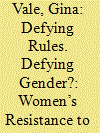

|
|
|
|
|
| Summary/Abstract |
Through disproportionate restrictions placed on women’s movement and visualization within its “caliphate”, the Islamic State (IS) group enforced its policies of female domesticity and submission. Studies on IS governance of local Iraqi, Syrian and Kurdish women have focused overwhelmingly on their victimization, abuse, and restricted agency. By contrast, this paper uncovers the opportunities, activities, and impacts of individual and collective nonviolent resistance led by local Sunni and Yazidi women. Through endeavors such as personal resilience, individual confrontations, and even group protest, local female civilian women acted against the group’s policies, members, ideology, and expectations of female passivity.
|
|
|
|
|
|
|
|
|
|
|
|
|
|
|
|
| 4 |
ID:
191481


|
|
|
|
|
| Summary/Abstract |
The study of online communication in extremist communities can benefit from novel methods to cast new empirical light on how individuals engage with the content of these phenomena. This work categorized such content through the systematic extraction of constructs used by members of Islamic-based extremist forums. To identify constructs that could attract engagement from extremists over time, a schema was developed from four proposed dimensions of extremism: conflict, emotion, religion, and role. Analysis of engagement relied on a mixed methods approach applied to numerous discussions on 11 independent forums, where constructs were coded according to schema dimensions. A novel change point detection methodology was used to examine the lifespan of constructs and empirically measure engagement, which was estimated across forums through meta-analyses. A small proportion of constructs experienced significant engagement over time, primarily concentrated in the religion and role dimensions. Both dimensions attracted high engagement in all the forums analyzed, where role had smaller effects than religion across forums. The forum context and extremist discourse make high engagement with religion an expected outcome, but similar results produced by the role dimension were surprising and should recalibrate thinking when compared to the traditionally studied emotion and conflict dimensions in online radicalization.
|
|
|
|
|
|
|
|
|
|
|
|
|
|
|
|
| 5 |
ID:
191457


|
|
|
|
|
| Summary/Abstract |
The rhetoric of the far-right typically depicts women in tripartite archetypes: as beloved mothers or sex symbols for far-rightist men or, less commonly, as fighters for the cause. But the propaganda and speeches that produced these archetypes of women are largely produced by far-rightist men. Do they reflect the lived experiences of women in the far-right? And how do far-rightist women – and men – react to such rhetorical messages about the female role? This paper broadens our understanding of modern white supremacist groups by examining the experiences of its female members. We employ lenses of emotionality and embodiment to understand how women accept and resist group-level gender expectations in white supremacism. This is responsive to the broader goal in research on women in terrorism and political violence to specify how women act within and beyond ascribed gender-typical roles. Our extensive interview data allow us to provide a rich depiction of the integrated natures of the public and private lives of white supremacist activist women, adding new information about a population of women engaged in political extremism and violent organization about which little is known.
|
|
|
|
|
|
|
|
|
|
|
|
|
|
|
|
| 6 |
ID:
191458


|
|
|
|
|
| Summary/Abstract |
The PKK’s gender policy, which includes maintaining a fighting force that is 40% female and the promotion of women’s liberation as a key component of its political platform, makes the PKK an outlier among both Kurdish nationalist groups and leftist armed movements in the Middle East. Based on interviews with members of the PKK’s allied civilian political movement and former PKK combatants, this paper argues that rather than being a function of the PKK’s ethnic or ideological identities, this policy emerged as a result of a confluence of four other factors: the PKK’s leftist ideology, the preferences of its leadership, and the need to recruit selectively all served as permissive factors. Ultimately, however, it was the greater participation of Kurdish women as a result of Turkish state violence in the Kurdish southeast in the 1980s that ultimately changed the PKK from within.
|
|
|
|
|
|
|
|
|
|
|
|
|
|
|
|
| 7 |
ID:
191463
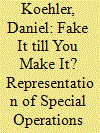

|
|
|
|
|
| Summary/Abstract |
Jihadist propaganda videos depicting training camps and combat scenes have steadily increased in variety and quality over the years. A small number of these videos attempt to mimic Special Operation Forces (SOF)’s tactics and skills. This subset of jihadist propaganda might go beyond a mere attempt to show prowess and reveal actual operational capabilities. This article analyzes three exemplary jihadist propaganda videos depicting claimed SOF capabilities through expert reviews with active service SOF personnel to assess the actual tactical quality of the content shown. It also discusses the potential reasons for those groups to mimic SOF and implications for counterterrorism.
|
|
|
|
|
|
|
|
|
|
|
|
|
|
|
|
| 8 |
ID:
191456
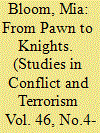

|
|
|
|
|
| Summary/Abstract |
As terrorist groups became more technologically advanced with their media campaigns, the global audience began to see pictures of women in black burkas pledging allegiance to the so-called Islamic State of Iraq and Syria (ISIS) and posing with guns. Although there is a backlash against such change that we see reflected in the ideologies of violent extremism; the shifts in gender relations within these groups are significant to examine. Further, we face questions about the repatriation of ISIS women and children to their countries of origin – notably questions of agency and culpability within the mainstream media. This paper asks: to what extent have women’s roles changed within and across terrorist groups? Is there a move toward women’s empowerment, or is it a facade? Analyzing the three cases of Al-Qaeda (AQ), Islamic State of Iraq and Syria (ISIS), and Kurdistan Workers’ Party (PKK) does their advent represent a significant shift? The emergence of ISIS and Boko Haram’s explicitly gendered strategies of violence and recruitment within the highly patriarchal and misogynistic Salafi-jihadist culture, and PKK’s postconflict gender-equal political advances demonstrates that addressing women’s agency through a gendered analysis outside of the masculine domain is imperative. Scholars should challenge the idea that women have limited roles.
|
|
|
|
|
|
|
|
|
|
|
|
|
|
|
|
| 9 |
ID:
191461


|
|
|
|
|
| Summary/Abstract |
The rise of populism and the radical right alongside ongoing global recruitment by jihadist groups has seen academics and popular discourse alike note parallels between the two. In particular, authors have emphasized gendered similarities between the movements. Based on ‘close-up’ ethnographic research, this article empirically shows how gender produces group members’ activism in two extreme movements: a network linked to the U.K.’s banned Islamist group al-Muhajiroun; and activists for the English Defence League, Britain First and other anti-Islam(ist) groups. Through a gendered analysis, the article problematizes assertions that the two movements mirror one another. In particular, it emphasizes the ways in which gender produces fragmentation across the anti-Islam(ist) movement, contrasted with a more consistent gendered logic in those networked to al-Muhajiroun. Its key contribution is to use ethnographic research to evidence the ways in which group members’ gendered activism ultimately undercuts group ideals.
|
|
|
|
|
|
|
|
|
|
|
|
|
|
|
|
| 10 |
ID:
191470


|
|
|
|
|
| Summary/Abstract |
Targeted killing is a cornerstone of counter-terrorism strategy, and tactical mistakes made by militant groups are endemic in terrorism. Yet, how do they affect a militant group’s suicide bomber deployment? Since joining Al-Qaeda, Al-Shabaab has carried out various types of suicide attacks on different targets. Using a uniquely constructed dataset, I introduce two typologies of suicide bomber detonation profiles – single and multiple – and explore the strategic purposes these have served for the group during multiphasic stages following targeted killings against the group’s leadership and targeting errors committed by Al-Shabaab. The findings reveal that targeted killing has the opposite effect of disrupting suicide attacks, instead, leading to a rapid proliferation of unsophisticated single suicide attacks against civilian and military targets to maintain the perception of the group’s potency. Thus, I argue that targeting errors made by Al-Shabaab have a more serious detrimental effect on its deployment of suicide attacks than any counter-terrorism measure.
|
|
|
|
|
|
|
|
|
|
|
|
|
|
|
|
| 11 |
ID:
191464


|
|
|
|
|
| Summary/Abstract |
The provision of law, order and justice are some of the most sacred responsibilities of the contemporary nation-state. However, non-state actors have frequently introduced their own jurisprudence, implementing courts and various forms of related law and order in broader attempts to implement governance. Yet, little research has examined the diverse contours of such jurisprudence, and how these aspects offer insights into how these groups vie for legitimacy, and how such jurisprudence helps them achieve their strategic aims. Examining AQAP in Yemen, HTS in Syria, and ISIS in Libya this article describes the implementation, scope and contours of jihadist jurisprudence.
|
|
|
|
|
|
|
|
|
|
|
|
|
|
|
|
| 12 |
ID:
191476


|
|
|
|
|
| Summary/Abstract |
The present article pursues a two-fold purpose. The first is to identify elements of continuity throughout history in internal armed conflicts where state structures are still in the process of being formed or, if already consolidated, where they have suffered serious deterioration. The second is to present and analyze a case study that has received scant attention in scientific literature on insurgencies, namely, the War of the Alpujarras, which was fought at the beginning of the early modern period and was the last Islamic rebellion in Spain.
|
|
|
|
|
|
|
|
|
|
|
|
|
|
|
|
| 13 |
ID:
191469


|
|
|
|
|
| Summary/Abstract |
This article discusses the trends and micro-dynamics of violence in northern Mali. Using a mixed research design, we focus on the violence used by jihadist groups during the first phases of the Malian civil war (2012–2015). Integrating research on civil war and terrorism, we distinguish between direct and remote violence. Quantitative analyses show that the involvement of jihadist groups in this conflict had a strong impact on the level and intensity of violence of all warring parties. Qualitative analysis of data collected during field research done in Mali between 2016 and 2017 complements the quantitative work. It enlightens that relational dynamics strongly influence the decision to resort to violence within non-state armed groups, including jihadist ones, while local contexts often explain temporal and geographic variations in violence.
|
|
|
|
|
|
|
|
|
|
|
|
|
|
|
|
| 14 |
ID:
191460


|
|
|
|
|
| Summary/Abstract |
The gender dimension of violent extremism is under-studied; and “women terrorists” are stereotyped as either men’s dupes or (internet) warriors. Applying a gender lens, this study uses content analysis to examine Islamist extremist websites in Indonesia. Analysis reveals distinct recruitment language targeted at women and men, and rigid gender segregation of content and spaces. Extremists co-opt the language of women’s rights while also promoting gender-discriminatory harmful practices with the intent of establishing what they consider to be a more devout Islamic state. Gender analysis of online extremism has implications for strategies to counter and prevent radicalization to violence.
|
|
|
|
|
|
|
|
|
|
|
|
|
|
|
|
| 15 |
ID:
191480
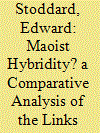

|
|
|
|
|
| Summary/Abstract |
While the recent literature on hybrid warfare has focused overwhelmingly on Russia, military tactical hybridity among non-state actors has received less attention, and minimal comparative examination. This is surprising as the range of non-state actors successfully using hybridized irregular-conventional tactics (increasingly symmetrically) against states has grown. Examining this phenomenon comparatively in three divergent cases (Islamic State, Boko Haram, the Houthi Movement), this article tests an often-overlooked argument stating that military hybridity among non-state actors is a result of these groups’ common adoption of a specific form of Maoist-style warfare strategy – emulative insurgency.
|
|
|
|
|
|
|
|
|
|
|
|
|
|
|
|
| 16 |
ID:
191472


|
|
|
|
|
| Summary/Abstract |
The Colombian counterinsurgency campaign against FARC, during the years 2003–2012, was successful in significantly reducing the insurgency to its weakest condition in history. The strategy was a result of the transformation of the leadership mind-set, which motivated an understanding of counterinsurgency as a political enterprise, demanding the participation of all state institutions and officials. This all-of-government approach allowed to place military action as part of a broader strategy, in which military commanders transformed the way the struggle was understood, placing legitimacy as a center of gravity in operations. However, the latter part of the strategy, the consolidation of state institutions in remote regions of the territory, wasn’t achieved, while extrajudicial killings clouded the entire success of the strategy.1
|
|
|
|
|
|
|
|
|
|
|
|
|
|
|
|
| 17 |
ID:
191465
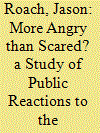

|
|
|
|
|
| Summary/Abstract |
Although public reaction to disaster has been the subject of much research, reactions to acts of terrorism have been studied less, sustaining a common assumption that fear is the generic response. The present paper tests this assumption through a survey of reactions to the Manchester Arena bombing and London Bridge attack of 2017, and the findings suggest that an important likely additional modal citizen reaction to such events is one of anger at the perpetrators, holding important implications for public policy and security practice in the wake of such acts.
|
|
|
|
|
|
|
|
|
|
|
|
|
|
|
|
| 18 |
ID:
191475


|
|
|
|
|
| Summary/Abstract |
Eight out of every 10 jihadists arrested or deceased in Spain between 2013 and 2018 are of Moroccan origin. This figure includes Moroccan nationals, Spanish nationals born in Morocco, and Spanish nationals descending from Moroccan immigrants. The historically restive Rif region of northwest Africa is the main geographical provenance of those who were born in Morocco and, similarly, because of violent Salafist who are natives of Ceuta and Melilla, of those who were born in Spain. All this reveals the extent to which the enduring reality of global jihadism in Morocco is projected externally onto Spain. This is unsurprising, since a large majority of Muslims in Spain come from Morocco or have Moroccan ancestors. Yet, the blooming of homegrown jihadism in Spain over the mentioned six-year period, largely resulting from the radicalization of Moroccan descendants or second generations, points toward the internal dynamics behind the phenomenon. In Spain, however, these second generations may or may not be in a diaspora situation, an important feature which is unique in the context of Western Europe.
|
|
|
|
|
|
|
|
|
|
|
|
|
|
|
|
| 19 |
ID:
191459
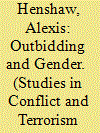

|
|
|
|
|
| Summary/Abstract |
The civil conflict in Colombia has gained attention in part for the inclusion of women in rebel forces and peace negotiations between the government and the Revolutionary Armed Forces of Colombia (FARC). Scholarship has often explained the FARC’s decision to mobilize women as both an ideological and tactical move, designed to increase the ranks of the organization and signal commitment to leftist principles. In this paper, I argue that the incorporation of women into Colombia’s civil war is better understood by viewing the country’s various leftist armed movements (including the ELN, EPL, and M-19) through a comparative framework. By applying the theoretical concept of outbidding, I argue that the mobilization and expansion of women’s roles in Colombian armed groups was in fact an intersubjective process, driven by competition among leftist movements existing in a crowded marketplace. In contrast to alternative explanations that focus on mobilization as an elite-driven process, I argue that the outbidding dynamic exposes agency among women recruited to these groups and demonstrates the potential for women to create strategic openings in times of conflict.
|
|
|
|
|
|
|
|
|
|
|
|
|
|
|
|
| 20 |
ID:
191467


|
|
|
|
|
| Summary/Abstract |
What explains U.S. media coverage of Americans kidnapped abroad? While some hostages receive national media attention, others hardly make the local news. Using an original, event count dataset of newspaper stories about Americans kidnapped abroad since 2001, this article tests the oft-cited, under-measured assumption that “terrorism” receives more media attention than other violence. Controlling for variation across kidnapping, I show that those framed as “terrorism” receive more coverage. Challenging existing literature, I also demonstrate that incidents with more victims receive less coverage than those incidents with fewer victims, and that there is no “missing white woman syndrome” in international kidnapping.
|
|
|
|
|
|
|
|
|
|
|
|
|
|
|
|
|
|
|
|
|